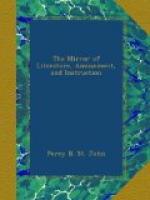* * * * *
SPANISH LITERATURE.
The Spaniards are particularly averse to borrowing from the intellectual treasures of other nations. They glean the field of their own muses to the very last ear, and then commence the same labour over again.
* * * * *
EVERY MAN HIS OWN LAWYER.
Here is a well-turned reply to plaintiff’s counsel, available in all suits and times. It occurred in the trial of Lord Danby, in the time of Charles II. “If the gentleman were as just to produce all he knows for me, as he hath been malicious to show what may be liable to misconstruction against me, no man could vindicate me more than myself.”
* * * * *
In modern education there is a lamentable lack of veneration for the great masters of English literature. Spenser, Milton, and Dryden are altogether less familiar to the present generation than they were to that which preceded it. “We will not say that our Shakspeare is neglected, for his age is ever fresh and green, and he comes reflected back to us from a thousand sources, whether in the tranquillity of home, the turbulent life of capitals, or the solitude of travel through distant lands.”—Edin. Rev.
* * * * *
RISE AND FALL.
What an idea of the dismantling of our nature do the few words which Roper, Sir Thomas More’s son-in-law, relates, convey! He had seen Henry VIII. walking round the chancellor’s garden at Chelsea, with his arm round his neck; he could not help congratulating him on being the object of so much kindness. “I thank our lord, I find his grace my very good lord indeed; and I believe he doth as singularly favour me as any subject in his realm. However, son Roper, I may tell thee, I have no cause to be proud thereof, for if my head would win a castle in France, it would not fail to be struck off.”—Edinburgh Review.
* * * * *
There is not only room, but use, for all that God has made in his wisdom—a use not the less real, because not always tangible, or immediate.—Ibid.
* * * * *
Nicholas Brady, (the coadjutor of Tate, in arranging the New Version of Psalms,) published a translation of the AEneid of Virgil, which (says Johnson,) when dragged into the world, did not live long enough to cry.
* * * * *
Blue appears to be the most important of all colours in the gradations of society. A licensed beggar in Scotland, called a bedesmen, is so privileged on receiving a blue gown. Pliny informs us that blue was the colour in which the Gauls clothed their slaves; and blue coats, for many ages, were the liveries of servants, apprentices, and even of younger brothers, as now of the Blue Coat Boys, and of other Blue Schools in the country. Women used to do penance in blue gowns. Is it not unseemly that blue which has hitherto been the colour of so many unenviable distinctions, should be the adopted emblem of liberty—English True Blue!




